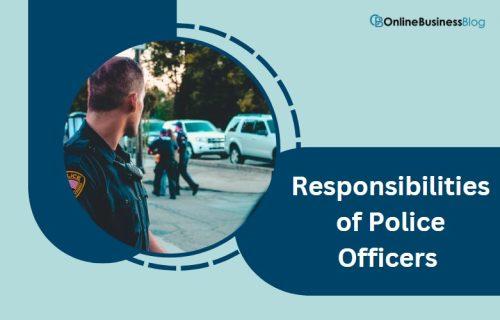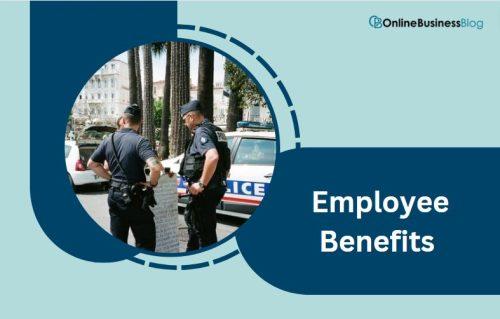Post Contents
Protecting and serving the community is an honourable duty that falls upon the shoulders of our brave police officers. But have you ever wondered how much they earn for their commitment and sacrifice? In this blog post, we will delve into the salaries of police officers in the UK, exploring different ranks, regions, and benefits. From constables to chief inspectors, we’ll uncover just how much these dedicated individuals make while keeping our streets safe. So grab a cuppa and join us as we unravel the mysteries behind police officer salaries in the United Kingdom!
Is It Worth Being a Police Officer UK?

Whether or not it is worth being a police officer in the UK is a personal decision that depends on your individual values and goals. Some people find the work to be very rewarding, as they are able to make a real difference in the lives of others and help to keep their communities safe. Others find the work to be stressful and demanding, and they may not be prepared for the challenges that come with the job.
Here are some of the pros and cons of being a police officer in the UK:
Pros:
- Make a real difference in the community
- Help to keep people safe
- Gain a sense of satisfaction and accomplishment
- Learn new skills and develop personal qualities
- Have the opportunity to work with a variety of people
- Enjoy a good salary and benefits
Cons:
- Stressful and demanding work
- Frequent exposure to violence and trauma
- Long hours and shift work
- Lack of job security
- Potential for negative public perception
Ultimately, the decision of whether or not to become a police officer is up to you. If you are looking for a challenging and rewarding career that allows you to make a difference in the world, then being a police officer in the UK may be the right choice for you.
Is Police a Good Salary in the UK?
The salary for police officers in the UK varies depending on rank, experience, and location. However, in general, police officers in the UK earn more money. The average salary for a police constable in the UK is £26,199 per year. This salary can increase with experience and promotion.
In addition to their salary, police officers in the UK also receive a number of benefits, such as a pension, health insurance, and paid leave.
Is Joining the Police Hard UK?
Joining the police in the UK can be a competitive process. There are a number of requirements that you must meet in order to be eligible to apply, including:
- Be a British citizen or have indefinite leave to remain in the UK
- Be at least 18 years old
- Have a good criminal record
- Be in good health
- Have five GCSEs at grade C or above, or equivalent qualifications
- Pass a number of physical and written tests
If you meet the requirements and are successful in the application process, you will be invited to an assessment centre. At the assessment centre, you will be interviewed, complete a number of exercises, and be assessed on your suitability for the role.
If you are successful at the assessment centre, you will be offered a place on the police training course. The training course typically lasts for 18 months.
So, is joining the police hard? It can be, but it is definitely possible if you are determined and meet the requirements.
Responsibilities of Police Officers

Police officers are the stalwarts of our communities, providing a visible presence that deters crime and reassures the public. Whether patrolling on foot, in cars, or even on bicycles, they keep a watchful eye over our streets and neighbourhoods. But their responsibilities extend far beyond simply being present; they also develop an intimate knowledge of their communities to identify individuals and locations at risk of being involved in criminal activities.
- When duty calls, police officers swiftly respond to calls from the public, rushing to assist during incidents ranging from accidents to emergencies. They work closely alongside community groups and individuals, forging strong relationships with those they serve. This collaboration helps them maintain peace at public meetings, social events, and processions – even during trade disputes or strikes.
- Handling potentially volatile situations requires finesse and sensitivity. Police officers must diffuse tensions while prioritizing everyone’s safety involved. These skills are especially critical when dealing with emotionally charged scenarios such as delivering news of sudden death or investigating sexual crimes.
- Gathering evidence is an essential part of any police officer’s job. From conducting initial investigations to taking statements and complying with legal requirements, meticulous attention to detail is crucial. Interviews with suspects, victims, and witnesses follow strict protocols rooted in relevant legislation.
- With great power comes great responsibility – this rings true for police officers when it comes to making arrests. They conduct arrests carefully considering human rights, and security measures for detained individuals as well as themselves colleagues, and members of the public. Once apprehended offenders are brought into custody safely following health and safety guidelines
- Preparing crime reports serves as another vital aspect of law enforcement duties where presenting accurate case files becomes paramount not only for senior officer review but also for submission Crown Prosecution Service (CPS) (England & Wales), Crown Office Procurator Fiscal Service (COPFS) Scotland) Public Prosecution Service Northern Ireland(PSNI).
- The role doesn’t end there – attending court hearings allows police officers to give evidence, ensuring that justice prevails. Administrative procedures and submitting intelligence reports are also important duties within the profession. Collecting, recording, and analyzing data is essential in order to develop strategies that will keep our communities safe.
- In an age where technology has become so prevalent, it’s important for police officers to stay up-to-date with the latest trends and technology that could help them better serve their communities. They provide crime prevention advice by sharing knowledge and insights gleaned from intelligence gathering.
- Police officers are vital members of our society and community policing is integral to their work. By upholding the law and safeguarding the safety of all those within their jurisdiction, they play a significant role in preventing crime from occurring in the first place.
How Much Does Police Officers Make?
Police officer salaries can vary greatly depending on factors such as rank, length of service, location, and qualifications. In England, Wales, and Northern Ireland, the starting salary for police constables is £21,402. After seven years of service, the average salary rises to £26,199 and can reach up to £41,130. In Scotland, the starting salary is slightly higher at £26,737 and can increase to £41,578 after ten years.
In London and the south of England specifically, police officers receive additional pay allowances of up to £6,735 due to regional differences in living costs. The Metropolitan Police follows a banded pay scale ranging from Band G (lowest) to Band A (highest), with corresponding salaries for each band.
For example:
- Band G: £22 306 -£22 543
- Band F: £23 903 -£25 835
- Band E: £26 611 -£28 604
- Band D: £30 294 -£32 552
- Band C: £37 569 -£45 189
- Band B: £48 997 -£60 115
- Band A: £67 261 to £77 982
Metropolitan Police officers move up a point on the scale each year until they reach the maximum permitted in their respective band. It’s also possible for officers to progress through the ranks and move between bands.
It’s important to note that Ministry of Defence police officers who specialize in firearms are paid differently due to their specialized training and responsibilities.
Overall, police officer salaries can vary depending on various factors across different regions but typically offer competitive packages based on experience level and rank within the force.
Employee Benefits

Employee benefits for police officers in the UK are quite attractive. They are entitled to a minimum of 22 days’ annual leave, which provides them with ample time to relax and rejuvenate. Additionally, they receive fully-paid sick leave, ensuring their well-being is taken care of during times of illness.
- One major advantage for police officers is that they are automatically enrolled on the police pension scheme. This means that they can have peace of mind knowing that their financial future is secured even after retirement.
- Depending on their location, police officers may also benefit from free local travel. This can be extremely advantageous as it helps reduce commuting costs and makes travelling more convenient.
- Moreover, some forces offer flexible working opportunities for police officers. This allows them to balance work and personal commitments effectively, promoting a healthy work-life balance.
- These employee benefits play a significant role in attracting individuals to pursue a career in law enforcement and contribute towards building a motivated and dedicated workforce within the police service.
Working Hours
Working as a police officer is not your typical 9-to-5 job. Full-time officers are expected to complete an average of 40 duty hours per week, usually in eight-hour shifts. However, being a part of the law enforcement community means providing a 24-hour public service, which often entails working unsocial hours and taking on shift work.
Emergency call-outs are also a regular feature of the job, requiring officers to be ready at any given moment. While regular shifts typically do not exceed ten hours, overtime opportunities may arise and are compensated at a higher rate.
For those seeking more flexibility in their work schedules, part-time positions, job-sharing arrangements, and flexible hour options are available within certain forces. This can allow individuals with other commitments or responsibilities to still contribute to keeping our communities safe while accommodating their personal needs.
Additionally, career breaks become possible for police officers after the probationary period. These breaks can provide opportunities for personal development or time away from the demanding nature of the job when needed.
The nature of policing requires adaptability and dedication to serving the public whenever they need it most. Police officers play a vital role in maintaining safety and security around-the-clock – always ready to respond to emergencies and protect their communities.
What to Expect?

The daily working environment of a police officer is incredibly diverse and ever-changing. You could find yourself patrolling the streets in a patrol car, walking the beat outside, stationed at the police station, or even attending court proceedings. In Northern Ireland, officers are routinely armed as part of their duties.
It’s important to note that the work environment can be physically demanding and potentially dangerous. Police officers often face challenging situations that can be emotionally draining and harrowing. The job itself is highly pressurized, with officers constantly being called upon to respond to emergencies and allocate their time and resources effectively.
Despite these challenges, being a police officer can also be immensely rewarding. Officers have the opportunity to work closely with communities and play an integral role in keeping the public safe. Work conditions may vary depending on regional factors such as local terrain, culture, and the size of the force.
People join specialized associations like the Police Federation of England & Wales or the Scottish Police Federation (SPF) after being hired as police officers. These organizations advocate for matters related to police welfare
Qualifications for Police Officer
Becoming a police officer doesn’t necessarily require a degree, making it an accessible career choice for both graduates and non-graduates. There are several routes available to enter the police force, depending on your qualifications and experience.
- One option is the Police Constable Degree Apprenticeship (PCDA), which is offered in England and Wales. This route combines work experience with earning a degree in Professional Policing Practice. Typically, you’ll need a level 3 qualification or equivalent work experience as a special constable to be eligible for this apprenticeship.
- Graduates with any degree can also apply for the Degree Holder Entry program. This two-year work-based training program is paid for by the police force you join and includes off-the-job learning. Successful completion leads to a Level 6 post-diploma in professional policing practices.
- Another pathway is undertaking a pre-joining degree, which involves completing a self-funded three-year academic degree in professional policing before applying for a job as a probationary police constable within five years of graduation.
- While these new routes have been introduced, there is still the traditional option of direct entry via the Initial Police Learning Development Programme (IPLDP). However, this method of entry is gradually being phased out.
- Recruitment procedures vary across different forces but typically involve submitting an online application form, attending selection assessment days and interviews, undergoing medical assessments and fitness tests, as well as providing references and undergoing security checks.
- British citizens, Commonwealth citizens, EC/EEA nationals, and foreign nationals without restrictions on their right to remain in the UK are all eligible to join the police force. Additionally, there’s also an exclusive two-year national leadership development programme called Police Now available to graduates with strong academic performance aiming at enhancing leadership skills while working as neighbourhood police officers.
- For specific information on becoming a police officer Scotland or Northern Ireland residents should refer respectively to Police Scotland or Careers in PSNI websites.
What Work Experience Should I Need?

Pre-entry experience is not a requirement to become a police officer, but having some relevant work experience can be beneficial. For instance, working with individuals or groups in the community, such as sports coaching or volunteering with local youth groups, can provide valuable insights and skills that are applicable to the role of a police officer.
- One option for gaining relevant experience is through volunteering with organizations like the Volunteer Police Cadets. This allows you to actively engage in community service while also getting hands-on exposure to law enforcement practices.
- Another opportunity is to volunteer as a police community support officer (PCSO), where you can work alongside regular police officers and share certain powers and responsibilities. This provides an excellent chance to observe and learn from experienced professionals in the field.
- Additionally, there is the option of becoming a special constable. Special constables are volunteer police officers who undergo comprehensive training and possess similar powers as regular officers. Volunteering as a special constable allows individuals to contribute directly towards maintaining law and order within their communities.
When applying for a career in the police force, it’s crucial to articulate your reasons for choosing this path and demonstrate knowledge of your local force’s structure, key challenges, senior officers, and jurisdictional area coverage.
Conclusion
Becoming a police officer in the UK is not only a noble profession but also a financially rewarding one. While the salary may vary depending on factors such as experience and location, police officers can expect to earn competitive wages that reflect their dedication and commitment to keeping our communities safe.
While salaries for police officers in the UK may vary based on individual circumstances such as location and experience level; they generally offer competitive remuneration packages along with several employee benefits. If you have what it takes to protect your community while facing various challenges head-on; then pursuing a career in policing might just be right for you!


